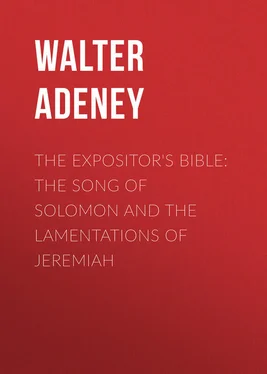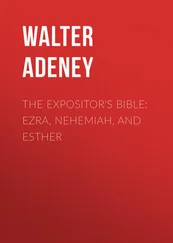Walter Adeney - The Expositor's Bible - The Song of Solomon and the Lamentations of Jeremiah
Здесь есть возможность читать онлайн «Walter Adeney - The Expositor's Bible - The Song of Solomon and the Lamentations of Jeremiah» — ознакомительный отрывок электронной книги совершенно бесплатно, а после прочтения отрывка купить полную версию. В некоторых случаях можно слушать аудио, скачать через торрент в формате fb2 и присутствует краткое содержание. Издательство: Иностранный паблик, Жанр: foreign_religion, foreign_antique, foreign_prose, на английском языке. Описание произведения, (предисловие) а так же отзывы посетителей доступны на портале библиотеки ЛибКат.
- Название:The Expositor's Bible: The Song of Solomon and the Lamentations of Jeremiah
- Автор:
- Издательство:Иностранный паблик
- Жанр:
- Год:неизвестен
- ISBN:нет данных
- Рейтинг книги:3 / 5. Голосов: 1
-
Избранное:Добавить в избранное
- Отзывы:
-
Ваша оценка:
- 60
- 1
- 2
- 3
- 4
- 5
The Expositor's Bible: The Song of Solomon and the Lamentations of Jeremiah: краткое содержание, описание и аннотация
Предлагаем к чтению аннотацию, описание, краткое содержание или предисловие (зависит от того, что написал сам автор книги «The Expositor's Bible: The Song of Solomon and the Lamentations of Jeremiah»). Если вы не нашли необходимую информацию о книге — напишите в комментариях, мы постараемся отыскать её.
The Expositor's Bible: The Song of Solomon and the Lamentations of Jeremiah — читать онлайн ознакомительный отрывок
Ниже представлен текст книги, разбитый по страницам. Система сохранения места последней прочитанной страницы, позволяет с удобством читать онлайн бесплатно книгу «The Expositor's Bible: The Song of Solomon and the Lamentations of Jeremiah», без необходимости каждый раз заново искать на чём Вы остановились. Поставьте закладку, и сможете в любой момент перейти на страницу, на которой закончили чтение.
Интервал:
Закладка:
The Expositor's Bible: The Song of Solomon and the Lamentations of Jeremiah
THE SONG OF SOLOMON
CHAPTER I
THE STRUCTURE OF THE BOOK
The Song of Solomon is a puzzle to the commentator. Quite apart from the wilderness of mystical interpretations with which it has been overgrown in the course of the ages, 1 1 To be considered later. See chap. iv.
its literary form and motive are subjects of endless controversy. There are indications that it is a continuous poem; and yet it is characterised by startling kaleidoscopic changes that seem to break it up into incongruous fragments. If it is a single work the various sections of it succeed one another in the most abrupt manner, without any connecting links or explanatory clauses.
The simplest way out of the difficulty presented by the many curious turns and changes of the poem is to deny it any structural unity, and treat it as a string of independent lyrics. That is to cut the knot in a rather disappointing fashion. Nevertheless the suggestion to do so met with some favour when it was put forth at the close of the last century by Herder, a writer who seemed better able to enter into the spirit of Hebrew poetry than any of his contemporaries. While accepting the traditional view of the authorship of the book, this critic described its contents as "Solomon's songs of love, the oldest and sweetest of the East;" and Goethe in the world of letters, as well as biblical students, endorsed his judgment. Subsequently it fell into disfavour, and scholars who differed among themselves with respect to their own theories, agreed in rejecting this particular hypothesis. But quite recently it has reappeared in an altered form. The book, it is now suggested, is just a chance collection of folk songs from northern Palestine, an anthology of rustic love-poems. These songs are denied any connection with Solomon or the court. The references to royalty are accounted for by a custom said to be kept up among the Syrian peasants in the present day, according to which the week of wedding festivities is called "The king's week," because the newly-married pair then play the part of king and queen, and are playfully treated by their friends with the honours of a court. The bridegroom is supposed to be named Solomon in acknowledgment of his regal splendour – as an English villager might be so named for his conspicuous wisdom; while perhaps the bride is called the Shulammite, with an allusion to the famous beauty Abishag, the Shunammite of David's time. 2 2 1 Kings i. 3.
Such a theory as this is only admissible on condition that the unity of the poem has been disproved. But whether we can unravel it or not, there is much that goes to show that one thread runs through the whole book. The style is the same throughout, and it has no parallel in the whole of Hebrew literature. Everywhere we meet with the same rich, luxurious language, the same abundance of imagery, the same picturesque habit of alluding to a number of plants and animals by name, the same vivacity of movement, the same pleading tone, the same suffused glow as of the light of morning. Then there are more peculiar features that continually recur, such as the form of the dialogue, certain recognisable characters, the part of chorus taken by the daughters of Jerusalem, in particular the gentle, graceful portrait of the Shulammite, the consistency of which is well preserved. But the principal reason for believing in the unity of the work is to be found in an examination of its plot. The difficulty of making this out has encouraged the temptation to discredit its existence. But while there are various ideas about the details, there is enough in common to all the proposed schemes of the story to indicate the fact that the book is one composition.
The question whether the work is a drama or an idyl has been discussed with much critical acumen. But is it not rather pedantic? The sharply divided orders of European poetry were not observed or even known in Israel. It was natural, therefore, that Hebrew imaginative work should partake of the characteristics of several orders, while too naïve to trouble itself with the rules of any one. The drama designed for acting was not cultivated by the ancient Jews. It was introduced as an exotic only as late as the Roman period, when Herod built the first theatre known to have existed in the Holy Land. Previous to his time we have no mention of the art of play-acting among the Jews. Nevertheless the dialogues in the Song of Solomon are certainly dramatic in character; and we cannot call the poem an idyl when it is rendered entirely in the form of speeches by different persons without any connecting narrative. The Book of Job is also dramatic in form, though, like Browning's dramatic poetry, not designed for acting; but in that work each of the several speakers is introduced by a sentence that indicates who he is, while in our poem no such indication is given. Here we only get evidence of a change of speakers in the form and contents of the utterances, and the transition from the masculine to the feminine gender and from the singular number to the plural. Even the chorus takes an active part in the movement of the dialogue, instead of simply commenting on the proceedings of the principal characters as in a Greek play. We seem to want a key to the story, and the absence of anything of the kind is the occasion of the bewildering variety of conjectures that confronts the reader. But the difficulty thus occasioned is no reason for denying that there is any continuity in the book, especially in view of numerous signs of unity that cannot be evaded.
Among those who accept the dramatic integrity of the poem there are two distinct lines of interpretation, each of them admitting some differences in the treatment of detail. According to one scheme Solomon is the only lover; according to the other, while the king is seeking to win the affections of the country maiden, he has been forestalled by a shepherd, fidelity to whom is shewn by the Shulammite in spite of the fascinations of the court.
There is no denying the rural simplicity of much of the scenery; evidently this is designed to be in contrast to the sensuous luxury and splendour of the court. Those who take Solomon to be the one lover throughout, not only admit this fact; they bring it into their version of the story so as to heighten the effect. The king is out holiday-making, perhaps on a hunting expedition, when he first meets the country maiden. In her childlike simplicity she takes him for a rustic swain; or perhaps, though she knows who he is, she sportively addresses him as she would address one of her village companions. Subsequently she shews no liking for the pomp of royalty. She cannot make herself at home with the women of the harem. She longs to be back in her mother's cottage among the woods and fields where she spent her child days. But she loves the king and he dotes on her. So she would take him with her away from the follies and temptations of the court down to her quiet country retreat. Under the influence of the Shulammite Solomon is induced to give up his unworthy habits and live a healthier, purer life. Her love is strong enough to retain the king wholly to herself. Thus the poem is said to describe a reformation in the character of Solomon. In particular it is thought to celebrate the triumph of true love over the degradation of polygamy.
It is impossible to find any time in the life of David's successor when this great conversion might have taken place; and the occurrence itself is highly improbable. Those however are not fatal objections to the proposed scheme, because the poem may be entirely ideal; it may even be written at the king. Historical considerations need not trouble us in dealing with an imaginative work such as this.
Читать дальшеИнтервал:
Закладка:
Похожие книги на «The Expositor's Bible: The Song of Solomon and the Lamentations of Jeremiah»
Представляем Вашему вниманию похожие книги на «The Expositor's Bible: The Song of Solomon and the Lamentations of Jeremiah» списком для выбора. Мы отобрали схожую по названию и смыслу литературу в надежде предоставить читателям больше вариантов отыскать новые, интересные, ещё непрочитанные произведения.
Обсуждение, отзывы о книге «The Expositor's Bible: The Song of Solomon and the Lamentations of Jeremiah» и просто собственные мнения читателей. Оставьте ваши комментарии, напишите, что Вы думаете о произведении, его смысле или главных героях. Укажите что конкретно понравилось, а что нет, и почему Вы так считаете.












